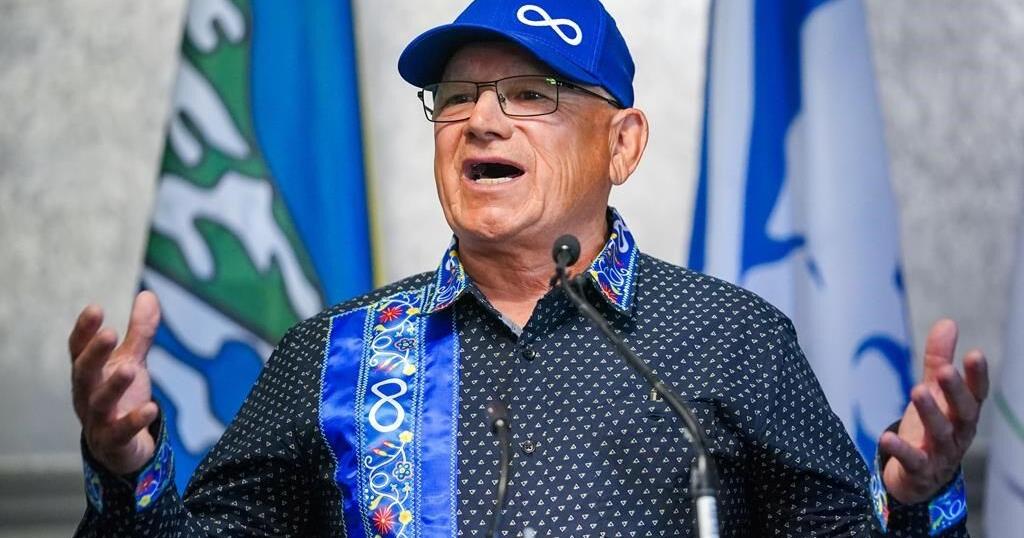OTTAWA – The Métis Nation of Saskatchewan has pulled out of a national body representing Métis, citing problems with an Ontario group and throwing the future of the Métis National Council into question.
In a resolution passed Thursday morning, the Saskatchewan group says the Métis Nation of Ontario, which is a member of the national body, accepts and continues to represent people who are not Métis.
“The Métis National Council has increasingly been used for advocacy purposes that are inconsistent with its original mandate and vision, diverting from the foundational role of representing Métis rights and self-determination,” the resolution says.
It also says the Métis National Council has failed to ensure the integrity of the Ontario group’s citizenship registry and has not rectified problems, despite constant calls to do so.
The resolution says its continued association with the Métis Nation of Ontario “no longer benefits the Métis Nation within Saskatchewan or the Métis Nation as a whole.”
The Métis Nation of Ontario did not immediately respond to a request for comment, but has previously defended its citizenship registry as being legitimate.
The departure of the Saskatchewan group comes years after the Manitoba Métis Federation withdrew from the council, citing similar concerns about the Métis Nation of Ontario.
“This was not a decision our government made lightly but one we felt necessary. Our (Métis Nation of Saskatchewan) government and our Métis communities need to have control over our identity and culture while making decisions that align with the values of our Saskatchewan Métis Nation,” said president Glen McCallum in a statement on Thursday.
The Métis National Council was, until Thursday, comprised of the Métis Nation of Saskatchewan, the Métis Nation of Alberta, the Métis Nation of Ontario and the Métis Nation of British Columbia.
The Saskatchewan group was a founding member of the national body, along with the Alberta group and the Manitoba Métis Federation.
According to the national council’s bylaws, quorum for its board of governors meetings must include two of the founding members. As of now only one remains, bringing into question the future of the organization, which often works with the federal government and advocates internationally for Métis.
Will Goodon, who serves as the Manitoba Métis Federation’s housing minister, said the national body is “dead today.”
“A meeting cannot be held. And they cannot change the bylaws without having a board of governors meeting,” he wrote on X.
Métis National Council president Cassidy Caron announced earlier this year she would not be seeking re-election, leaving an open contest for someone to fill her post.
The board voted to postpone and reschedule a September vote and general assembly to November. Caron said in a newsletter that her term will end on Sept. 30 either way.
The Saskatchewan group had already pulled support for federal legislation that would enshrine its self-government over concerns about the Métis Nation of Ontario and the Métis Nation of Alberta, which were also included.
McCallum said in April the legislation was holding the group back, and that they needed to put the needs of Métis in Saskatchewan first.
First Nations chiefs in Ontario and the Manitoba Métis Federation consistently raised concerns about the Ontario group as the legislation was being studied by a House of Commons committee, with Métis Nation of Ontario president Margaret Froh billing the self-government process as the longest in Canadian history.
First Nations chiefs in Ontario have accused the federal government of overstepping its jurisdiction and alleged the legislation infringes on their rights.
The Assembly of First Nations, which represents some 630 chiefs across Canada, passed a resolution calling for the federal government to kill the legislation altogether. The AFN’s concerns are mainly focused on six new communities the Métis Nation of Ontario and the province recognized in 2017, which it says have no historical basis to exist.
The Manitoba Métis Federation has also opposed the extension of self-government to the Métis Nation of Ontario, saying the Ontario group’s membership is not on par with its definition of Métis.
The Métis Nation of Ontario has disputed that, pushing back against the idea Métis only exist around the Red River in Manitoba.
This report by The Canadian Press was first published Sept. 19, 2024.

























